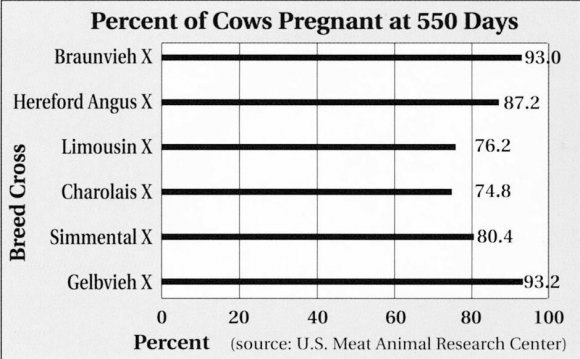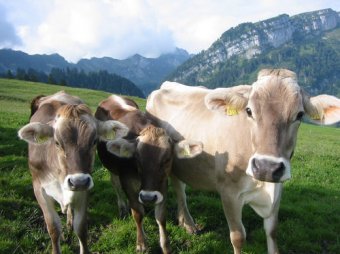
Originating in the from the Alpine regions of Europe, the Brown Swiss breed has successfully travelled to all corners of the world and adapted as one of the leading breeds of milking cow, particularly where the primary market for milk is the manufacture of cheese.
 The Brown Swiss breed is known for their exceptional feet and legs. These strongly built animals will last in
The Brown Swiss breed is known for their exceptional feet and legs. These strongly built animals will last in
any dairy operation for many lactations due to their sound feet and leg structure and well-attached udders.
Brown Swiss adapt to any climate or environmental condition, being noted for their resistance to extremes in temperatures. Brown Swiss cattle show more insect resistance and have dark skin pigmentation around their eyes, which lessens the occurrence of pink eye infections; it is primarily for these reasons that they are proving popular with large dairy units across both North and South Americas and also in the Middle East.
They are renowned for their natural grazing instinct and efficient conversion of forage and the relatively flat lactation curve gives rise to breed’s reputation for having statistically fewer metabolic problems.
Brown Swiss can serve many purposes, proving that it is not just volume of milk production that aids the overall profitability of dairy farm units, but more the total package combining ease of management along with quality milk production and of course longevity.
Crossbreeding Using Brown Swiss
(Rebil Plaintiff Ruth)
For years the Dairy industry has resisted the practice of crossbreeding for what can only be described as ‘a fear of the unknown’. However those milk producers that have embarked upon crossbreeding programmes using the Brown Swiss Breed have found to their advantage that cross breeding with Brown Swiss provides:
High Components
High Milk Production
Low Somatic Cell Count
Well-attached Udders
Sound Feet & Legs
Reproductive Efficiency
Docile Temperament
Disease Resistance
Heat Tolerance
Strength
Longevity
Adaptability
Versatility
Durability
Beware of the Bull:- Please can breeders remember that the Brown Swiss breed is a dairy cow and the bulls must be handled with extreme care as with all other dairy bull breeds. In the interests of safety, members are also reminded that dairy bulls, over 10 months of age, should not be in fields that have public footpaths running through them. click here for Countryside & Wildlife Act 1981 section 59









